Despite Gridlock, Americans Prefer Divided Government To One-Party Rule
Divided government is the worst political system ever, except for all the others.
While the American people continue to state via the polls that they are frustrated by the gridlock on Capitol Hill as evidenced most recently by the government shutdown/debt ceiling crises, there doesn’t seem to be any evidence that they prefer the alternative to the divided government that has contributed to gridlock:
PRINCETON, NJ — Even as the division of power in Washington between Republicans and Democrats is wreaking havoc with the federal government, Americans’ preference for having one political party run both the White House and Congress is at a record low.
At, 25%, the percentage of Americans today favoring one-party control in Washington is virtually equivalent to the 28% who favor splitting power between the two parties. The plurality, 38%, say it makes no difference.
The latest figures are from an Oct. 3-6 Gallup poll, conducted within the first week of the partial federal government shutdown. The freeze on non-essential services resulted from the failure of President Barack Obama and the Republican-led House of Representatives to agree on the latest continuing resolution needed to fund the government.
The chart tells the story of how these attitudes have changed over the past decade:
It’s worth noting, of course, that the largest number of respondent right now are of the opinion that it makes no difference whether we have divided government or one-party control. While I don’t have access to poll internals, I’d suggest that this is largely a reflection of the fact that public trust in government as a whole is at all time lows at the moment. Therefore, the cynical position is to simply say that it really doesn’t matter whose in charge. It’s also interesting to note the spike in respondents in support of one-party control that seems to have happened shortly after the 2012 elections. The fact that it dropped off so quickly suggests that this was little more than post-election euphoria among people who supported Barack Obama in that election.
Breaking it down by party, it’s clear that, at least at the moment, Democrats are more amenable to the idea of one-party government than any other political demographic:
With a Democratic president in office, Democrats currently favor one-party control over divided control by 40% to 14%, with 36% saying it makes no difference. Democrats’ resulting +26 net support for single-party control over divided control is down from +36 in 2012 amid the heat of the presidential election campaign, but is still strong relative to their views during Republican George W. Bush’s presidency. At that time, from 2002 through 2008, Democrats showed at most a slight preference for single-party power, with their net support for it ranging from -24 to +13.
Republicans, on the other hand, currently believe that having different parties control the presidency and Congress is the better scenario: 19% favor one-party control and 37% favor divided control, with 33% saying it makes no difference. Republicans’ -18 net support for one-party control today is a sharp change from 2011 and 2012, when they held a slight preference for one-party control. Republicans showed even higher net support for one-party control across Bush’s two terms, ranging from +14 to +38.
Independents are the most likely of the three party groups to say neither scenario is necessarily better for the country, at 41%. However, the remainder currently lean more heavily in favor of divided government than single-party control, 33% vs. 18%, for a net -15. That represents lower support for single-party control than in 2012, but is similar to the average among independents from 2002 through 2011.
Of course, as Gallup notes, these divides tend to be very cyclical depending upon which party controls the White House:
Quite obviously, Republicans generally favored the idea of one-party control of Executive and Legislative Branches of the Bush Administration, while Democrats largely and Independents opposed it. Once the Democrats took control of Congress in 2006, and then to a greater extent after President Obama took office while Republican support for the idea of one-party control dipped significantly. One interesting data point apparent in the chart above is the dip in support for one-party rule among Republicans that took place after the 2006 elections. Arguably, this was both a reaction to the fact of Democratic control of Congress, and the potential that a Democrat could be elected President in 2008, and of the sudden drop in support for George W. Bush in the final years of his Presidency. The one constant, of course, can be seen in the self-described Independents who have largely consistently opposed the idea of one-party rule regardless of who controls which branch of the Federal Government. Yes, there have been fluctuations, such as a massive dip in support for one-party government at the beginning of Bush’s second term, but as a general rule this cohort of respondents have remained expressly supportive of the idea of divided government, which, of course, we’ve had since the GOP won the House in 2011.
Much has been written about the wisdom of a system such as ours which makes divided government possible as opposed to Parliamentary systems where, generally, Executive and Legislative authority end up being completely in the hands of whichever faction(s) happen to control the majority. Obviously, it is far easier in such a situation for the majority party to get their agenda through, as well as to deal with issues such as passing budgets and other regular functions of government. At the same time, though, these systems lack the same kind of checks and balances against majority rule that the Constitution contains. Those checks and balances exist in no small part because the Founders wished to avoid the problems that they saw in places like Great Britain where Parliamentary majorities and the Sovereign were able to run roughshod over the rights of minorities, most specifically the Colonies.
For the most part, I’d argue that those checks and balances have served the nation well over the years. For every example of frustrating “partisan gridlock” one can point to, there have been plenty of times when Congress has admirably performed its task of blocking an overreaching Executive, or vice versa. It was, for example, a Democratic Senate that forced Franklin Roosevelt to abandon his ill-advised, power-grabbing, Court Packing scheme. It was a Democratic Congress that pushed back against Richard Nixon’s overreach as Watergate became to unfold. And, it was a Republican Congress that made it clear to President Clinton that he would have to move to the right on issues like welfare reform and abandon the overreaching that had occurred during the first two years of his Presidency. Finally, to bring this discussion into the contemporary era, it is worth noting that the Federal Government was shutdown for more days during Jimmy Carter’s Presidency (a total of 57 days in only four years) than under any other President since 1976.1 That’s a sign that gridlock isn’t always necessarily a partisan issue.
Leaving aside the theoretical arguments that can be made for and against a system similar to our Constitution and for or against a Parliamentary system, though, this poll says the same thing that previous polls have said. For all its faults, the American people tend to prefer a system where power in Washington, D.C. is in the hands of different parties. In some sense this seems to contradict other polling that shows that the public wants their representatives on Capitol Hill and in the White House to work together to solve the nation’s problems, but I’d suggest that there’s a certain wisdom to it. Clearly, the public recognizes that a system that forces both sides in a sharply divided nation to come together and work out the nation’s problems is preferable to one where one side is able to impose its will without much regard for the objections or opinions of the minority. That, after all, is what our Constitution, the very concept of Federalism, and the Bill of Rights are all about and, quite clearly, the public believes that this is how it should be. For the most part, I think they’re right.
_____________________
1 The Government was shut down for ten days during Gerald Ford’s Presidency, 14 days during the eight years of Ronald Reagan’s Presidency, 3 days during George H.W. Bush’s four year Presidency, and 26 days during the eight years of Bill Clinton’s Presidency, all of which is attributable to the two shutdowns in 1995 and early 1996. There were no government shutdowns during the Bush 43 Presidency. (Source)
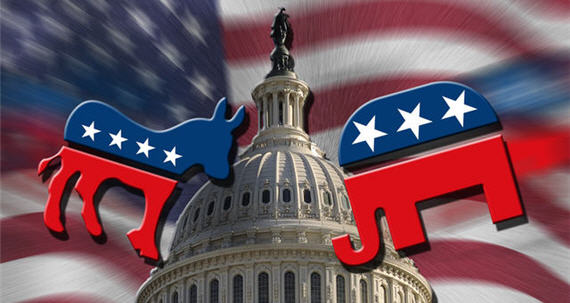
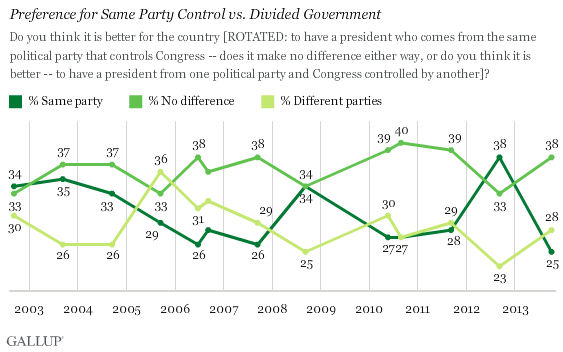
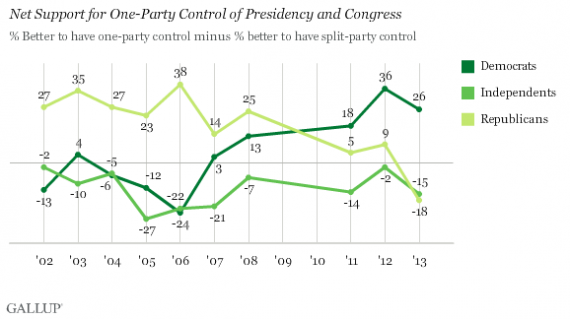

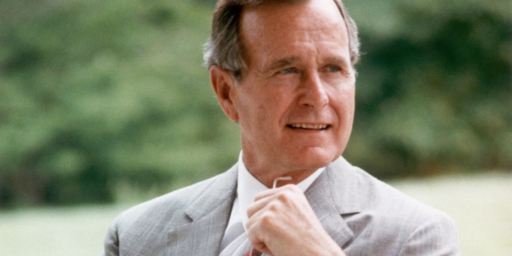

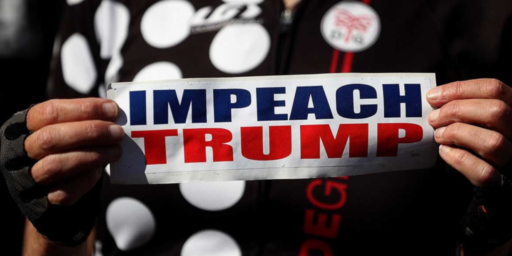
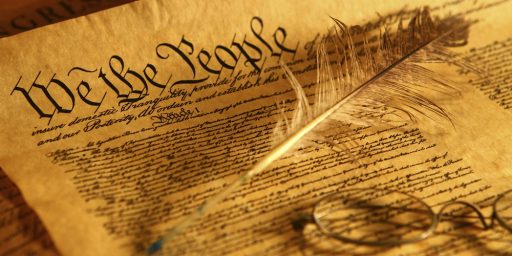
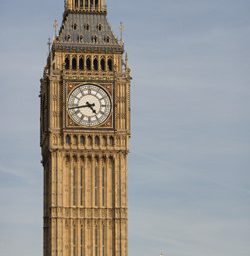
The people generally lag the politically-attuned class by about five years. It’s taken this long just for the majority to figure out that the Tea Party are just old racist a-holes, something that was not exactly hard to figure out if you were paying attention. They’re just now beginning to wake up to the fact that those old, racist a-holes now dominate the GOP. Ask the question again in a year, after people have had time to enjoy the lower health care rates, the improved security and benefits and the way the sky doesn’t fall.
@Doug Mataconis:
No, you can’t say that from this poll. The difference is within the margin of error.
Also, Gallup should have asked two question.
One about divided power with both parties being sane, the other about divided power with one party being insane.
Well yeah, because, you know … both sides do it, both sides are same.
As the politics of the past 21 years have shown us, both sides are definitely NOT the same.
Of course the problem is we don’t have have parties we have at least three parties that call themselves Republicans and perhaps two that call themselves Democrats.
One thing that I think most Americans don’t appreaciate is that parliamentary systems have their own checks and balances. The ability to enact your agenda has the flipside of being just one election away from being overturned. It is as difficult to repeal legislation in the USA as it is to enact them, while an overreaching party in a parliamentary system can be flushed out of government in one go. This tends to cement the parties more in the center, and to not radically alter the government unless there is broad support for such a thing.
Secondly, parliament can just replace an executive that tries to grab too many powers. Getting rid of a President is much more difficult, and has huge political risks.
And if you have a parliamentary system where coalitions are the norm, those tend to moderate the government agenda as well.
This seems akin to polls showing most Americans are conservative. They both show most Americans don’t understand any of this stuff.
Hell, in principle I prefer divided control. But that assumes two rational parties keeping each other honest. Far from our current situation.
Volokh circa 2008 riffing on his 2003 article:
http://www.volokh.com/posts/1225324497.shtml
Divided government is per Volokh just one of the elements leading to the more trenchant question of whose party is going to get the votes and wield power.
@Ron Beasley:
Do you really think that there are real blocks inside the DEmocratic Party. Which part of the party is not wanting a bigger goverment with higher taxes, more spending, and a bigger safety net. The only issue that the Democrats have is that most of the Democratic Party voters are not willing to pay the taxes necessary to fund the size and scope of government programs that they support. Even the social libertarians in the Democratic Party want a massive government safety net to back up their libertarian personal decisions.
Most Americans really want a one party state no matter what they say to any pollster. Most Americans live in locations where there are few, if any, competitive elections. Most Americans automatically vote for one party or another. The number of swing voters has been shrinking for decades.
As politics become about entitlements, who pays for them, and who receives the, there is no need for more than one political party. As national politics becomes how to pay for healthcare, pensions, and education, I foresee that not only will be a one party state but that politics will be dominated by women. Why would men want to get invovled in politics when the point of the government is to fund and provide a nanny state.
Is this like the fiction of “invisible Angels” that are supposed to protect children?
When the Republican Party goes back to sanity I’ll start voting for them again. So, not at all for 12 years or so.
@Doug Mataconis:
Actually, that poll is from Sep 6-9, thus before the election. And in 2008, when there also was a spike, the poll is from Sep 8-11.
So, before the last two Presidential elections, when voters were actually able to vote for both Congressional candidates and for President, there were spikes.
Interesting, isn’t it?
@merl:
Talking about sanity with defining sanity is a pointless piece of rhetoric. If you think that the current Democrats are sane, then it is impossible for the more conservative party to ever appeal to you.
@superdestroyer:
That’s the smartest observation I’ve seen on the net in months. Congratulations.
@superdestroyer:
While many conservatives want the federal government to keep out of their Medicare or Social Security.
@al-Ameda:
How many progressives talk about legalizing drugs but want govenment funded drug treatment programs. Progressives want to personally benefit from all of the drug use but want taxpayers to fund all of their rehab and treatment once they decide to get clean.
A true libertarian does not mind the drug use but would say that the government should never fund any drug treatment programs. People who use drugs should start using them with the knowledge that the government will never go anything to help them. In the long run, there would be much less drug use (alcohol abuse, single mother parenthood) if the government would stop its enabling of bad behavior. Progressive really support the enabling of the government because not only does it ease the pain of bad decisions but it also employees a huge number of progressives.
@Pinky:
If you are being snarky, then please describe any government program out side of defense and law enforcement that progressives are willing to cut. There is no part of the Democratic Party that is willing to discuss limiting entitlements or liminting the size/scope of the government. I have always found that progressives think they are clever enough to take advantage of government programs while sticking someone else with the bills.
As I’ve said, this isn’t the divided government, or gridlock, voters had in mind.
They have new data.
I am sure quite a few have the flexibility to adjust accordingly.
@superdestroyer:
The Sierra Club supports an end to farm subsidies.
As long as our legislators and populace want such terrible laws, I would rather have gridlock. It’s less dangerous. Just imagine if every stupid bill had passed.
I also think many tend to blame the structure of government for the problems inherent in the laws being proposed. There are lots of cases where opinions on a law are diametrically opposed, and one side is right and one side is wrong. That gridlock has nothing to do with the form of government, it has to do with the fact that some people want to keep passing laws that violate our rights. And in many cases, both parties want to. In those cases, thank goodness nothing happens.
@ Super
I am willing to bet that there are more than a few progressives in here who have a larger tax bill than you do. I have often found that conservatives who are far more takers than makers labor under the delusion that they are carrying the world on their shoulders.
@john personna:
Actually I believe that the Sierra Club does not like subsidies to factory farms (however that would be defined). I think the Sierra Club is supportive of subsidies to organic/family/hipster farms.
@superdestroyer:
First, you claim was that progressives could not support spending cuts outside defense and law enforcement. So “done” on that.
Second, you just said “ignoring the big ticket items.”
@superdestroyer:
Libertarians want some kind private sector purity here. I see it differently, I look at this as a practical matter.
As taxpayers in California we spend $30,00 to $40,000 a year per incarcerated drug felon, the cost of drug rehab is far less than that, and the potential benefits far exceed the cost of ongoing lock-up or return to prison. It seems to me that the taxpayers definitely benefit from paying for drug rehab when it’s compared to prison lock-up.
@al-Ameda:
A libertarian would argue that the government does not need to lock up drug users nor does the government need to fund their rehab. A real libertarian would suggest that drug users should be free to use all the drugs they want and should be free to suffer all of the negative quality of life issues that would go along with abusing drugs.
What progressives want is all the fun that goes along with drug use while externalizing the cost of maintaining their lifestyle to someone else. That is why government spending will keep going up and progressives will be the one dominant political force in the U.S.
@superdestroyer:
Wow, that’s the libertarian position? That progressives are the drug users and they want taxpayer sponsored treatment? Jeez, you need to update your stereotypes. Essentially you’re saying that the most important technological advances of the past 30 years have been created by self-centered drug using entrepreneurs and technology employees in the San Francisco Bay Area.